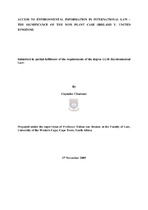| dc.description.abstract | Ireland and the United Kingdom are since 1993 in conflict about a Mox plant at Sellafield, on the Irish Sea. This plant is designed to recycle the plutonium which is produced during the reprocessing of nuclear fuel to reclaim the uranium contained in it. Ireland has tried to contest the British decision to build and operate the Mox plant through all the legal means available. An important request of Ireland was to be more and better informed in order to better contribute to the protection of the marine environment of the Irish Sea. Ireland and the United Kingdom are Member of two important treaties addressing the issue of environmental information: the United Nations Convention on the Law of the Sea (UNCLOS), and the Convention for the Protection of the Marine Environment of the North-East Atlantic (OSPAR Convention). Ireland has sought a remedy through the procedures of dispute settlement instituted by those two treaties. The Mox Plant Case is therefore very complex, each of these procedures being conducted within the textual confines of the treaties that govern them. In July 2003 the Arbitral Tribunal constituted under the OSPAR Convention rejected Ireland’s request to have access to more information about the Mox plant. The procedure introduced by Ireland in October 2001 before an Arbitral Tribunal constituted under the UNCLOS is still pending. In this context, waiting for the final decision of this Arbitral Tribunal, the ITLOS ordered in December 2001, as a provisional measure, that Ireland and the United Kingdom must cooperate and exchange information. In November 2003, the Arbitral Tribunal constituted under the UNCLOS has suspended the proceedings, waiting for a decision of the European Court of Justice (ECJ). Indeed the European Commission, backing up the position of the United Kingdom, initiated proceedings against Ireland before the ECJ in 2003. The Mox Plant Case illustrates and addresses several predominant matters in international environmental law. Firstly it illustrates the complexity of a system where several treaties between the same parties regulate the same issues. As a consequence in this case not less than four international jurisdictions have been and are still involved in the matter, leading to procedural difficulties. Secondly the Mox Plant Case illustrates the considerable difference of opinion which exists in the area of international environmental law with respect to the meaning and nature of the notion of ‘access to information’, and its relationship to other ancillary and concomitant notions, e. g. ‘collaboration’, ‘cooperation’, ‘participation’, etc., by and amongst states. The meaning of this concept, which is the cause of the dispute, differ depending on the context of treaty within which it is used. | en_US |

